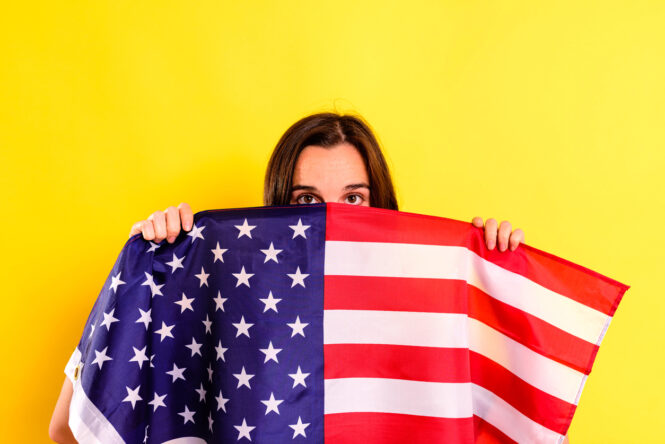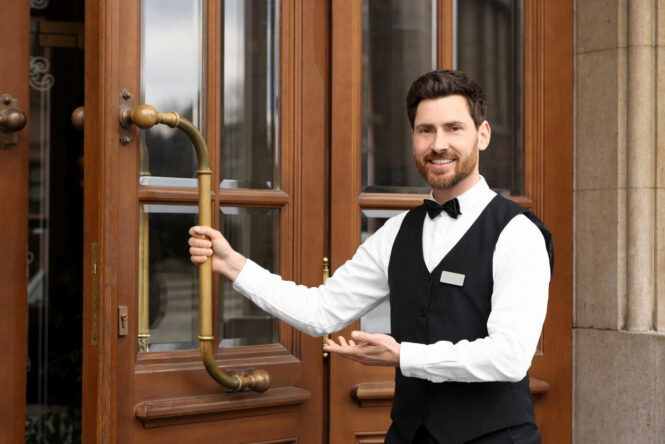British manners are famously polite, often charming, and sometimes a little unnerving if you’re not used to them.

Well, at least that’s true for Americans, for whom the whole system can feel like walking into a play where everyone else knows their lines and cues, and you’re just awkwardly improvising your way through.
It’s not that we’re judging (well… not always). It’s just that the social etiquette is so finely tuned that if you miss a beat, you feel it. Whether it’s how you queue or what you say when someone bumps into you, here are some of the behaviours that come naturally to us that make Americans feel like they’re constantly under observation.
1. Saying “sorry” even when it’s clearly not our fault

In this country, “sorry” is less about apologising and more about social smoothing. Someone steps on your foot? You still say sorry. Accidentally get in someone’s way? You say it again—twice, maybe, just to be sure. To an American, it can feel like a strange apology contest where everyone’s trying to out-remorse each other. It’s not performative; it’s just habit. But if you don’t join in, you might feel like the odd one out in a sea of quiet regret.
2. Overthanking… followed by being thanked for thanking

Over here, there’s often a chain reaction of thank-yous. You’ll thank someone, they’ll thank you for thanking them, and before you know it, you’re stuck in a politeness loop you can’t quite escape. People from the US are usually surprised by how many thank-yous are expected in a single interaction. It’s not uncommon to hear four “thanks” in under ten seconds—and if you miss your cue, you’ll feel it. Silently, but definitely.
3. The judgemental silence on public transport

Get on a London tube during rush hour, and you’ll notice it’s dead silent—apart from the occasional cough or rustling of a newspaper. People avoid eye contact, sit in silence, and definitely do not speak above a whisper. For Americans used to chatting with strangers or putting phone calls on speaker, it’s easy to feel like every move is being silently scored. Even opening a snack feels like a risk to your social standing.
4. The intense politeness that feels vaguely sarcastic

“Would you mind terribly if I just… squeezed past?” sounds sweet until you realise someone’s nearly climbing over you with a fixed smile and zero body space. The words are polite; the energy, however, is slightly threatening. To our friends across the pond, our politeness can feel like a riddle. Is this person genuinely being nice? Or do they secretly hate me? The truth is, it’s often both. It’s part of the charm—and the confusion.
5. The unspoken “no talking in lifts” rule

Getting into a lift with strangers in Britain means one thing: absolute silence. You’ll stand two feet away from someone, often shoulder to shoulder, and not acknowledge each other’s existence until the doors reopen. Americans who make cheerful small talk in lifts may be met with confusion—or, worse, blank stares. It’s not rudeness. It’s just that in the UK, the lift is a sacred space for silent suffering.
6. The obsession with “making a brew” in any crisis

Feeling anxious? Have a cuppa. Just got dumped? Tea. Fire alarm went off? Put the kettle on. Brits will offer you tea in literally any situation, and saying no might earn you a confused blink and a polite “Are you sure?” To Americans, the frequency of tea offers can feel like some kind of social test. Say yes too fast and you’re eager. Say no and you’re possibly broken. Just say yes and accept the biscuit—it’s safer that way.
7. Applauding when someone almost drops something

There’s a very specific brand of British humour that involves lightly humiliating your friends when they mess up in public. Drop your phone and catch it midair? Expect slow, sarcastic clapping. To an American, it feels like everyone turned into a dry-humoured commentator all at once. You’re being lightly mocked, yes—but with affection. Maybe.
8. Saying “lovely” even when they’re deeply unimpressed

“Lovely” is one of those words that can mean almost anything depending on the tone. Sometimes it means “wow, that’s great,” and other times it’s code for “I will never recover from this disappointment.” Americans often take it at face value, not realising it’s been deployed as a polite buffer. If we say, “That’s lovely” with a pause and a smile that doesn’t reach their eyes… run.
9. The overly specific way of offering help
 Source: Unsplash
Source: Unsplash British people rarely just say, “Can I help you?” Instead, they’ll offer help in a way that implies you should already know what you’re doing. “Are you alright there?” is common—but don’t be fooled. We’re not asking about your mental state. To Americans, it can sound like a subtle judgement wrapped in a question. You’re never quite sure if they’re being kind or pointing out that you’re very much doing it wrong.
10. The facial expressions that don’t match the words

A Brit can tell you something is “fine” while looking like they’re in emotional distress. Or insist they’re “absolutely delighted” while maintaining a deadpan expression. To Americans who tend to be more expressive, this mismatch is confusing. You start wondering if you’ve misread the situation—or if the situation is actually a test of your social instincts. Spoiler: it often is.
11. The unwritten rule of “one door, one person at a time”

Hold the door open too long and you’re making everyone uncomfortable. Don’t hold it at all, and you’re rude. There’s a very narrow window where door-holding is considered socially correct in Britain. People from the US, who are often overly generous with door-holding, might find themselves stuck in an awkward “you go—no you go” dance that seems to go on forever. The key is: be efficient, not heroic.
12. Offering a seat with the energy of a formal ceremony

“Would you care to have a seat?” may sound like something from a period drama, but it’s very much alive in everyday British life. The way it’s said can feel oddly official, as though accepting the seat means signing a social contract. Americans used to casual invitations might find the tone a bit intense, like they’ve just been offered a place on a royal council. Best to just say “thank you” and sit, no curtsy required.




